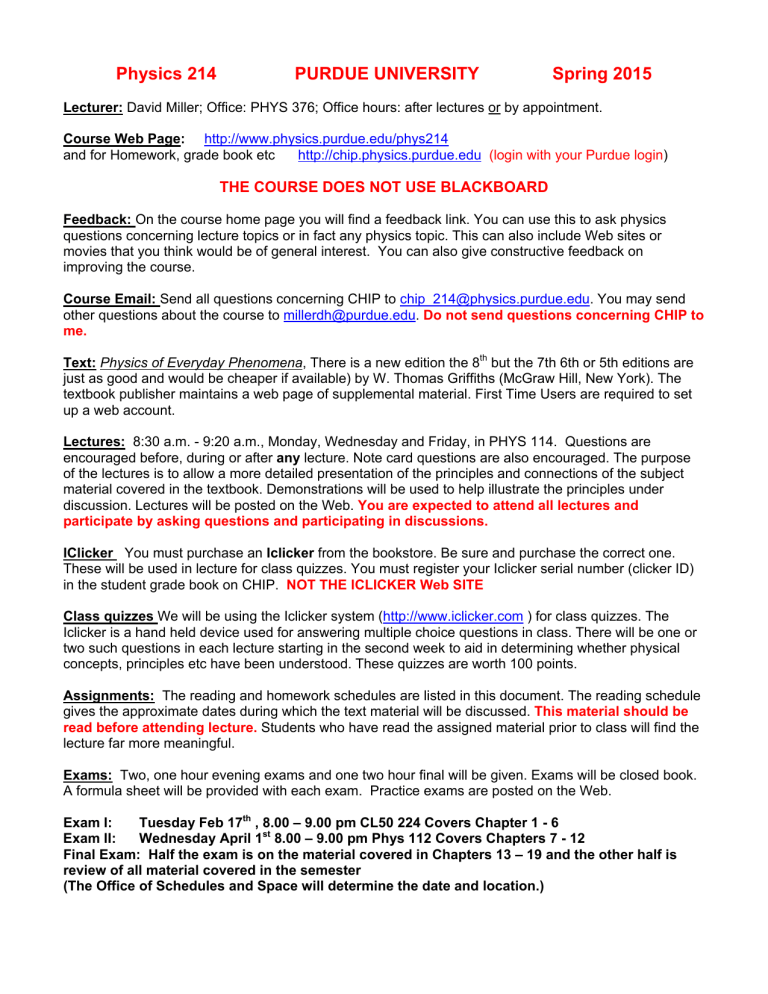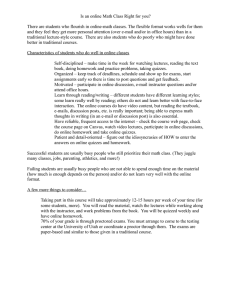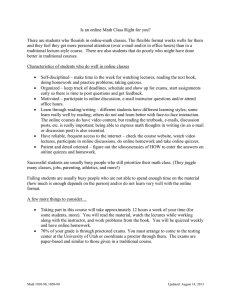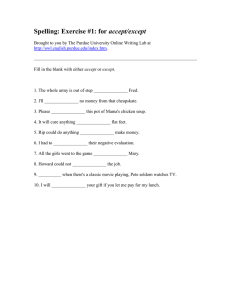Physics 214 PURDUE UNIVERSITY Spring 2015

Physics 214 PURDUE UNIVERSITY Spring 2015
Lecturer: David Miller; Office: PHYS 376; Office hours: after lectures or by appointment.
Course Web Page: http://www.physics.purdue.edu/phys214 and for Homework, grade book etc http://chip.physics.purdue.edu
(login with your Purdue login )
THE COURSE DOES NOT USE BLACKBOARD
Feedback: On the course home page you will find a feedback link. You can use this to ask physics questions concerning lecture topics or in fact any physics topic. This can also include Web sites or movies that you think would be of general interest. You can also give constructive feedback on improving the course.
Course Email: Send all questions concerning CHIP to chip_214@physics.purdue.edu
. You may send other questions about the course to millerdh@purdue.edu
. Do not send questions concerning CHIP to me.
Text: Physics of Everyday Phenomena , There is a new edition the 8 th
but the 7th 6th or 5th editions are just as good and would be cheaper if available) by W. Thomas Griffiths (McGraw Hill, New York). The textbook publisher maintains a web page of supplemental material. First Time Users are required to set up a web account.
Lectures: 8:30 a.m. - 9:20 a.m., Monday, Wednesday and Friday, in PHYS 114. Questions are encouraged before, during or after any lecture. Note card questions are also encouraged. The purpose of the lectures is to allow a more detailed presentation of the principles and connections of the subject material covered in the textbook. Demonstrations will be used to help illustrate the principles under discussion. Lectures will be posted on the Web. You are expected to attend all lectures and participate by asking questions and participating in discussions.
IClicker You must purchase an Iclicker from the bookstore. Be sure and purchase the correct one.
These will be used in lecture for class quizzes. You must register your Iclicker serial number (clicker ID) in the student grade book on CHIP. NOT THE ICLICKER Web SITE
Class quizzes We will be using the Iclicker system ( http://www.iclicker.com
) for class quizzes. The
Iclicker is a hand held device used for answering multiple choice questions in class. There will be one or two such questions in each lecture starting in the second week to aid in determining whether physical concepts, principles etc have been understood. These quizzes are worth 100 points.
Assignments: The reading and homework schedules are listed in this document. The reading schedule gives the approximate dates during which the text material will be discussed. This material should be read before attending lecture.
Students who have read the assigned material prior to class will find the lecture far more meaningful.
Exams: Two, one hour evening exams and one two hour final will be given. Exams will be closed book.
A formula sheet will be provided with each exam. Practice exams are posted on the Web.
Exam I: Tuesday Feb 17 th
, 8.00 – 9.00 pm CL50 224 Covers Chapter 1 - 6
Exam II: Wednesday April 1 st
8.00 – 9.00 pm Phys 112 Covers Chapters 7 - 12
Final Exam: Half the exam is on the material covered in Chapters 13 – 19 and the other half is review of all material covered in the semester
(The Office of Schedules and Space will determine the date and location.)
Homework: We will use the Computerized Homework in Physics (CHIP) system to assign credit for homework completed this semester. Many years of experience has shown that any problem you think
CHIP may have is usually related to a misunderstanding on your part. The misunderstanding could be as simple as a minus sign or a lack of accuracy when entering your answer.
The homework assignment for each week typically consists of CHIP and pre-lecture quizzes. Using the
CHIP web-based system, you can enter your quiz answers (before 8:30 AM of due date) and homework answers (before 12 noon of due date) into CHIP. Note that the pre-lecture quizzes have a time limit and will accept only ONE answer.
For exercise problems requiring a numerical answer (not multiple choice), you will receive two (2) tries for full credit. If you answer the question correctly on your 3 rd
try, you will receive ½ credits. On your fourth try you will receive ¼ credits. If you answer the question correctly on the fifth or higher attempt, no credit will be assigned.
Grades: There is one overall letter grade for the course, determined on the basis of 600 points as shown below. We will be using the plus minus grading system A+, A, A-, B+, B, B-, C+, C, C-, D+, D, D-, and F
Two one-hour evening exams (100 points each) = 200 points
Final Exam
Class quizzes
Pre-lecture Quizzes (normalized)
CHIP Homework (normalized)
Total
= 200 points
= 100 points
= 50 points
= 50 points
--------------
600 points
The Homework score will be calculated after dropping the 5 lowest scores.
The class quiz score will be calculated after dropping the 10 lowest scores.
The Pre Lecture Quiz score will be calculated after dropping the 5 lowest scores.
(Dropping the lowest scores usually takes care of missed assignments due to computer problems or minor illness. Valid reasons for missing additional Homework or quizzes will be dealt with on an individual basis)
Course Office: The place to go for organizational information on the course is the Physics
Undergraduate office, PHYS 144 (telephone: 49-42970).
Help: In addition to me there will be a TA in the course
Ian Arnold Room 137
iarnold@purdue.edu
and information on office hours will be announced
There are three levels of help
See myself or Ian Arnold during office hours
Send questions by email to millerdh@purdue.edu
or iarnold@purdue.edu
See me after lecture and make an appointment
Cheating and Dishonest Behavior: Dishonesty will not be tolerated during this course. Such actions are detrimental to your own development and unfair to all other students in the university. Any form of cheating no matter how minor, will lead to an immediate F in the course and possible dismissal from
Purdue.



